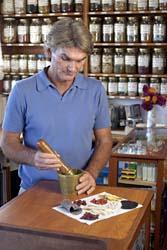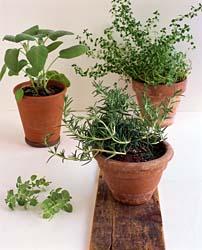Attack on Herbs ‘almost worthless’
A number of UK newspapers carried a ‘report’ from the Penninsular Medical School, Exeter in the first week of October 2007 along with headlines claiming, "Herb cures that ‘do you more harm than good’."
That well-known medical journal, the Daily Mail, opened with ‘Herbal Medicines which are tailor-made for individual health problems can do patients more harm than good, experts warn. They say there is no evidence that these therapies work or they are safe to use. The researchers said these mixtures should be banned.’
However even this article went on to say that the team looked at 1,300 published articles on the subject and analysed the only three found to be randomised clinical trials. In two of the three studies there was no statistical difference in the results from tailored herbal medicine and a placebo.
Newspaper articles then went on to question the efficacy of all Chinese, Ayurevedic and Western Herbal medicine. This report comes at the same time as Britain is reviewing the laws on the regulation of tailored herbal treatments. Dr Peter Carter who led this study wants them banned even if that means upsetting Chinese or Indian communities.
Now, it seems to us that drawing a conclusion that there is ‘no evidence’ whilst dismissing 1,297 pieces of research because they were not randomised clinical trials is a bit ‘dodgy’ at best, worsened by the fact that one of the three taken actually did show evidence. Furthermore the generalized attacks in the press then tar all herbal medicines with the same brush, when even Dr Carter goes on to say that, ‘many studies did promote the effectiveness of herbal medicines, but most were examining standard preparations or single herb extracts’.
So, in truth, this attack seems almost worthless to us but does raise three important points:
Yet again, as we have seen with studies on anti-oxidants and vitamin E in recent months, these reports (mega-studies) are nothing of the sort and dismiss good research from qualified experts because it is not a ‘randomised clinical trial’. They then extrapolate a conclusion from a very limited number of studies into a sweeping statement, which may or may not be true in reality. At best this results in mis-leading press comment. At worst it is quackery and does us all a dis-service.
It is acknowledged that individual herbs do have proven benefits – but there is a valid question to answer: What happens when people (even trained, Government approved herbal experts) start mixing them up to treat specific ailments? For example, could some of those herbs conflict with others in the same mix?
As Jane Gray of the National Institute of Medical Herbalists offered, all of the UK’s 1,000 registered herbal practitioners are in private practice without the time or funds to conduct these ‘randomised clinical trials’. So how do we fund the evidence, since herbs have been with us for a very long time and restricting their usage because no individuals have the time or funds to do the research privately would be quite ridiculous? Yet again at icon we would argue the need for an independent body such as they have in the USA with their Government-funded Institute for Complementary Health.
To try to shed more light on this for our readers we went to our Herbal expert Alan Hopking to ask his expert, professional views.
Why does no one ‘Ask the Experts’?
 Once more we have the media jumping on the bandwagon of unsubstantiated claims by an academic researcher with impassioned headlines just to cause a stir and attract unwarranted attention. It never ceases to astonish me! I’ve been around as a herbal practitioner for a long time (over 25 years) and yet still we get the media highlighting a one-sided ‘blinkered’ argument, without even bothering to consult the experts - the very clinicians who are using prescriptive herbal treatments as their day in day out form of healing – medical herbalists.
Once more we have the media jumping on the bandwagon of unsubstantiated claims by an academic researcher with impassioned headlines just to cause a stir and attract unwarranted attention. It never ceases to astonish me! I’ve been around as a herbal practitioner for a long time (over 25 years) and yet still we get the media highlighting a one-sided ‘blinkered’ argument, without even bothering to consult the experts - the very clinicians who are using prescriptive herbal treatments as their day in day out form of healing – medical herbalists.
Herbal practitioners can only stay in business if their methods of treatment are effective.
And I’ve yet to hear of one qualified herbalist being sued for ‘doing more harm than good’. I’ll refrain from redirecting this statement towards a more legitimate target!!
Herbs have been through Clinical Trials
I use mostly Western herbs, that is, herbs that are native to Europe, successfully and safely in use for 100s of years. No better clinical trial, one could say. The same can be said for Ayurvedic, Chinese and African herbs. However, it is a truth that most of the herbs used by practitioners in these disciplines have undergone extensive examination regarding their constituent actions and clinical trials. You only need to take the British Herbal Pharmacopoeia first published in 1971. This ‘book’ is a monumental work with all the research findings for each of the herbs used by the modern herbalist. The broad-based scientific committee overseeing the research represented pharmacy, pharmacognosy, science and medicine as well as herbal practice. Each member made their contribution according to their specialized knowledge. The herbs were even taken through chromatographic examination by Professor E. Shellard PhD FPS FRIC FLS.
On the face of it, it would be nice to have double blind clinical studies of each of the medicinal herbs we use and involving scores of patients with the same diagnosis. But funding apart, it’s simply not worth the effort and expense owing to the fact that we just don’t approach patients with this simplistic symptomatic method of treatment. We really do look at the whole patient (it’s not just a cliché), the prescription we give is based on the whole patient (not just the symptoms) involving many herbs, that may be adjusted during follow-up consultations according to the indications. There are so many factors to be taken into account when treating people; five minutes with your doctor and pill-popping is not our way of caring.
Herbs, whole herbs and nothing but the herbs
Let’s take a closer look at what Dr Peter Canter and Professor Edzard Ernst are making noises about, as reported in The Independent recently. Let’s sweep away the reporter’s jargon in the article. This is the nub of their statement:
“[That the sale of herbal medicines to be banned unless evidence of their efficacy can be shown.”
There’s nothing wrong in this, but as I’ve said, we have chapter and verse on their efficacy. And if the usefulness of a herb can’t be demonstrated there’ll be no need to ban it, it won’t be used and won’t sell, like so many common herbs have gone by the wayside over the years since Culpeper’s time. Don’t forget people have always had the choice to visit a herbalist and use his wares. Not so with the modern oncologist and his elixirs.
sell, like so many common herbs have gone by the wayside over the years since Culpeper’s time. Don’t forget people have always had the choice to visit a herbalist and use his wares. Not so with the modern oncologist and his elixirs.
“Where there are known risks and no evidence of benefit, there can be no justification for allowing them to remain on to the market.”
I agree. But this brings me to a previous article I wrote for icon. We use the tested whole herbs. But often these are ‘confused’ with ‘standardised extracts’ and ‘isolated constituents’, which are often a long way removed from the original herb – some even form the basis for drugs – and they are simply not the same thing as using whole herbs. By all means research and/or ban the artificial and the extracts, but the whole herb that has been studied and used for centuries should still remain legal. Kava Kava is a case in point in this instance.
Then we get more of the reporter’s spin
Yet there are risks. Some herbs are toxic and have damaged organs such as the kidney and liver; some are misidentified and wrongly included in remedies; some are adulterated with prescription drugs such as steroids or polluted with agro-chemicals; some interact in dangerous ways with orthodox medicines.
These are not herbs. These are industrialised and adulterated tablets or capsules called by a herbal name. To repeat: Herbal medicines, as used by qualified medical herbalists, are whole, unadulterated plants. We never use these adulterated shadows of herbs. The dangerous interactions referred to are due to the isolated and concentrated active constituents masquerading as a whole herbal plant. The standardised extract (standardizing and concentrating the active constituent of the plant extract) may have about as much relevance to the original as a Chinese Rolex has to a Swiss one.
Can we really trust the randomised trials?
Then the last half of the reporter’s article takes a more balanced view:
The randomised controlled trial is a relative newcomer to medicine. Orthodox medicine also carries its own risks: the powerful painkiller Vioxx, for example, was withdrawn from sale after it was linked with heart attacks.
For all the hype about randomised controlled clinical trials, they didn’t sift that one out, did they?
Fears about the side effects of conventional medicines and disappointment at their failure to heal the chronic ailments… complementary medicine has done orthodox medicine a service by reminding doctors of the power of care… the consultations are detailed and lengthy, patients feel taken seriously, and the focus is on results, not scientific explanations. At least half of all GPs refer some patients to complementary practitioners paid for by the NHS, according to the Smallwood report commissioned by the Prince of Wales Foundation for Integrated Medicine in 2005.
Whole Herbs – the original healers
Finally, Prof. Ernst sees sense:
…there is good evidence from randomised trials that certain herbal remedies are effective – St John’s wort for depression, hawthorn for congestive heart failure, gingko biloba for dementia… Prof Ernst cautions not to throw the baby out with the bathwater and condemn all herbal medicine as ineffective.
 do not to throw the baby out with the bathwater and condemn all herbal medicine as ineffective
do not to throw the baby out with the bathwater and condemn all herbal medicine as ineffective Now, if in the few trials officially conducted, there are six herbs that have been proven effective, is it not probably that 60 or 600 or 6000 will have the same legitimacy? After all, we knew before the hugely expensive randomised clinical trials that St John’s Wort was good for depression, that hawthorn was good for heart disease, that ginkgo was good for Alzheimer’s, and so on, so it follows that the hundreds of years of clinical use of the 300-400 herbs in common use by modern herbal practitioners have proven the medicinal action of them all as both safe and effective. And, what’s more, if I combine the six proven herbs as tinctures in a bottle for a patient and find it is effective (as Prof Ernst claims), why can’t I find other herbs equally effective when I combine for a patient after a consultation? Surely herbs like Sage, Rosemary, Thyme, Nettle, Yarrow, Elder flower, Bugle Weed, Horsetail, Cleavers, Plantain, Dandelion, Burdock, Yellow Dock, Sheep’s Sorrel, Bistort, Valerian, and so on and on are valued and proven herbs just by their very demand?
Now, if in the few trials officially conducted, there are six herbs that have been proven effective, is it not probably that 60 or 600 or 6000 will have the same legitimacy? After all, we knew before the hugely expensive randomised clinical trials that St John’s Wort was good for depression, that hawthorn was good for heart disease, that ginkgo was good for Alzheimer’s, and so on, so it follows that the hundreds of years of clinical use of the 300-400 herbs in common use by modern herbal practitioners have proven the medicinal action of them all as both safe and effective. And, what’s more, if I combine the six proven herbs as tinctures in a bottle for a patient and find it is effective (as Prof Ernst claims), why can’t I find other herbs equally effective when I combine for a patient after a consultation? Surely herbs like Sage, Rosemary, Thyme, Nettle, Yarrow, Elder flower, Bugle Weed, Horsetail, Cleavers, Plantain, Dandelion, Burdock, Yellow Dock, Sheep’s Sorrel, Bistort, Valerian, and so on and on are valued and proven herbs just by their very demand?
Maybe even the British Government regards testing each herb a waste of time and money: Professor Ernst says that it would be better to do trials to determine what works before regulating. However, an application by his own department two years ago for government funding to test herbal medicines was turned down. So who will pay?
As Chris Woollams often points out: ‘We are but animals that have lived in a state of balance with our natural surrounds for hundreds of thousands of years. In the Middle- Ages, Hampton Court  using whole herbal medicines as supplied by herbal practitioners is the best way
using whole herbal medicines as supplied by herbal practitioners is the best way Palace was not surrounded by rose beds but by herb gardens and we picked and ate various combinations daily, knowing they helped our health anyway while using them as medicines too. The advent of extracts, the conversion of parts of herbs to become toxic drugs, the development of chemical agents, these are the alarming and rapid steps that have appeared for barely fifty years in this otherwise safe long-term evolutionary process. We were always at one with our surrounds and animals in the wild today still know this. The true Gold Standard by which all medicines should be judged is the herb’.
Palace was not surrounded by rose beds but by herb gardens and we picked and ate various combinations daily, knowing they helped our health anyway while using them as medicines too. The advent of extracts, the conversion of parts of herbs to become toxic drugs, the development of chemical agents, these are the alarming and rapid steps that have appeared for barely fifty years in this otherwise safe long-term evolutionary process. We were always at one with our surrounds and animals in the wild today still know this. The true Gold Standard by which all medicines should be judged is the herb’.
And using whole herbal medicines as supplied by herbal practitioners is the best way to get safe, effective treatment.